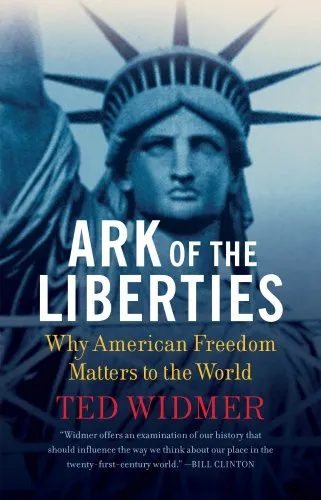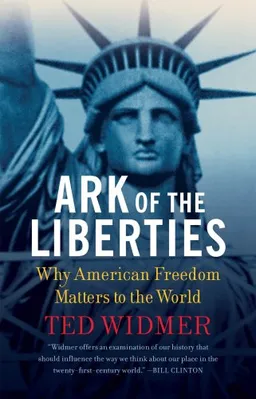Ark of the Liberties recovers a long-forgotten success story: America’s lengthy and laudatory history of expanding world liberty. Our country’s decline in popularity over the past eight years has been nothing short of astonishing, and with wit, brilliance, and deep affection, Ted Widmer reminds us why this great nation had so far to fall. His sweeping history brims with new insights about America’s enduringly favorable relationship with the Middle East; why Woodrow Wilson’s presidency deserves reappraisal; the Democratic Party’s underappreciated foreign-policy achievements; and how the country’s long history of successfully advocating for and exporting liberty touches immediately on the choices we face in Iraq today. Ark of the Liberties romps through centuries of history—from America’s start as a fascinating virgin promised land to its present position as a world superpower—all the while reminding us of the necessity and nobility of our nation’s global ambitions. Ted Widmer directs the John Carter Brown Library at Brown University. He was a foreign policy speechwriter and senior adviser to President Clinton, and is Senior Research Fellow of the New America Foundation. He is a frequent contributor to The New York Times, The Washington Post, and The New York Observer. The United States stands at a historic crossroads: essential to the world yet unappreciated. The nation has fallen out of favor with other countries at a rapid rate since the turn of the new century. With wit, sound arguments, and deep affection, Ted Widmer revisits the many reasons why the nation had so far to fall. In a history of centuries, Ark of the Liberties recounts America’s ambition to be the world’s guarantor of liberty. From the Declaration of Independence to the Gettysburg Address to the Universal Declaration of Human Rights, the United States, for all its shortfalls, has been by far the world’s greatest advocate for freedom. Generations of founders imbued America with a surprisingly global ambition that a series of remarkable presidents, often Democratic, advanced through the confident wielding of military and economic power. Ark of the Liberties introduces new insights: America’s centuries-long favorable relationship with the Middle East; why Wilson’s presidency deserves reappraisal; Bill Clinton’s oft-overlooked achievements; how America’s long history of foreign policy immediately touches on the choices we face in 2008. Fully addressing America’s disastrous occupation of Iraq, Ark of the Liberties colorfully narrates America’s long and laudatory history of expanding world liberty. “[An] elegant history of the ideas that shape American foreign policy. And no idea has influenced America’s understanding of its role in the world as decisively as the concept of liberty. Widmer meticulously traces the contradictions, triumphs, and betrayals of liberty that have unfolded across the centuries of the American experience.”—Evan R. Goldstein, The Chronicle of Higher Education
"There’s a nice passage, a dozen or so pages into Ted Widmer’s new book about the history of American foreign policy, in which he talks about how delighted European explorers were, once in the New World, to discover tobacco. Dried, rolled and lighted, the plant signified nothing less than 'the intoxicating newness, excitement and danger of the Americas,' Mr. Widmer writes . . . These lines stand out because, like a struck match, they throw sparks and cast some angular light . . . His book is a winding overview of American foreign policy and the ideas that have animated it, with particular attention paid to America’s deeds (some dirty, some much less so) in the name of championing liberty."—Dwight Garner, The New York Times
"Now, with Ark of the Liberties: America and the World, a buoyant sweep over 300 years of American foreign policy, Mr. Widmer—he’s Ted again—auditions for a role even more problematical than rock star or Clinton counselor: certified public intellectual . . . If Widmer the journalist, policy wonk and hard-rock nobleman has gifted anything to Widmer the intellectual with public aspirations, it’s an intuitive sense of what thoughtful civilians need in their popular history. From his opening ruminations on Herman Melville (who used 'ark of the liberties' in a pre-Moby Dick sea yarn) to his supple portrait of F.D.R. as 'nothing less than the philosopher-king of the new world coming into existence,' Mr. Widmer disguises any seam between the entertaining and the edifying. In Ark of the Liberties, he’s jettisoned the trappings of academic historiography that had decorated Young America: Gone are the dry declarations of theses and methods, the minute textual dissections of period documents, and, most noticeably, the extended slogs through thickets of secondary sources. (One thing Dad does not want in his July 4 reading is 'literature review.') But Ark of the Liberties never reads like a gloss on some more serious work; delightfully, it is that work. In substance as well as style, it yokes adroit provocation to apparent populism. United States foreign policy, Mr. Widmer argues, cannot be reduced to realist considerations of territory, markets or the global balance of power; central to its history is America’s singular imaginative power, as New World and City on the Hill—the 'pitch and heave' of an 'ark of the liberties' entrusted with mankind’s deliverance. 'We have nothing less than a mission to redeem the world,' insists the preface, '1776 genuinely signaled the beginning of a new time in human history.' Such language suggests a hoary chauvinism, but don’t be fooled. Descriptive and normative perform an intricate pas de deux in Ark of the Liberties: The American Exceptionalism, in Mr. Widmer’s view, is less about proving the moral supremacy of a country than demonstrating the tenacity of an idea—precisely the idea of America as exception . . . For Mr. Widmer, the apparent slipperiness of ‘liberty’—in 1776, a shibboleth of Enlightenment; in 1846, a euphemism for human bondage—is no reason to reject it as serious object of historical study. Quite the contrary. In Ark of the Liberties, the word’s the thing: Particular phrases and rhetorical tropes—metonyms, ultimately, for ways of thinking—recur and resonate over the centuries; as an omnibus volume on America and the World, it provides a counter-history at once deeply conservative and slyly irreverent. The insights can be deliciously unexpected. Among the most prominent touchstones—second perhaps only to 'liberty' and its ark—is millennialism. From the Great Awakening to Manifest Destiny, Wilson’s Fourteen Points to the Cold War, the impending 1,000-year reign of Christ—or some secularized equivalent thereof—oddly pervades Mr. Widmer’s account . . . the narrative is both synthetic and strangely synesthetic, as crackling free-form facts and pungent turns of phrase congeal into surprisingly persuasive arguments. Colors turn into theologies turn into geopolitical orientations: 'New Englanders lavished attention on obscure bits of Scripture that seemed to favor the wilderness, the West . . . They understood acutely the importance of tactical gains and losses









